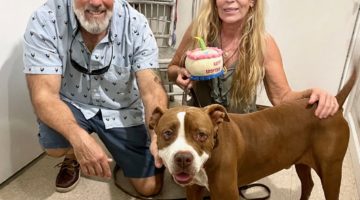Rescue Tails / Chico From Fright to Fun
“Poor thing; he must have been abused!” is what we often think when we see a fearful dog. Some dogs do suffer at the hands of cruel people, but there may be other factors in play that can cause a dog to be wary or afraid. While these factors are less dramatic, they are no less impactful on a dog’s behavior and quality of life.
Breed and individual genetics are not stand-alone causes of fearful behavior, but they do influence behavior in dogs. Some breeds are selectively bred to be more cautious of strangers and less social in general . In addition, there is genetic variation among individual animals within the same breed. Some are outgoing and confident, while others more shy.
Fearfulness is often caused by a lack of appropriate early socialization. When puppies lack positive and safe exposure to a variety of people, places, and things during a critical development phase, their confidence as adults around the “unfamiliar” may be greatly reduced and their resiliency in the face of change impaired. At any point in a dog’s life, a single traumatic experience can result in lifelong fears, similar to PTSD, and can require the help of a skilled professional.
Two more factors can set the stage for fear in dogs: medical issues that cause pain or distress and environmental conditions that cause stress or anxiety. If dogs feel overwhelmed without any way to gain relief in their environment, they may begin avoiding those overwhelming things and seek escape.
We may not know a fearful dog’s history, but we can work with the behavior we observe. This brings us to the story of Chico and the couple who changed his life. Chico was a young adult Chihuahua, surrendered to us along with his mother. Both dogs were afraid but Chico’s behavior was extreme. He’d bolt to the back of his kennel and shake with fear when anyone approached and then turn and charge the gate, barking explosively at us as we moved away. Any attempts to reach for him would result in yelping and attempts to bite. We saw real fear in this little guy and considered the possible reasons for it.
Given that his mother was timid, it’s possible there was some genetic influence. It was also likely that his early life experiences didn’t prepare him for the big world. Finally, the shelter itself, (his environment) was a very real contributor to his fear. We couldn’t change some things, but other things maybe. We began working with him and after seeing some progress, began looking for a special home. Someone would have to be on Chico’s timetable, not their own, and have lots of patience and understanding.
Darya and Gene expressed interest in a small dog and after speaking with them, we realized we may have found Chico’s people. We told them Chico wouldn’t let anyone touch him, but if they were interested, we could work together and see where it led. They were willing and then amazingly, for the next several weeks, visited him on every day off. Sitting quietly, tossing treats, hoping to eventually be able to touch him but making no demands. They familiarized themselves with canine body language. They identified how Chico was feeling and adjusted their behavior accordingly. Chico received the time and space he needed; his trust grew. On the day they took him home, we admitted we didn’t know how it would go. How trusting would he become? How long it would take? Darya, smiling sweetly, told us “If it takes a week or takes a year, it doesn’t matter; we are committed to Chico!”
Their updates and videos could not be better. Chico has surpassed our hopes for him, thanks to this wonderful couple! His new name is Rocky and Darya says he is becoming a “normal dog” who plays, loves, and lives his new life to the fullest.
If you have a dog (or other companion animal) who is fearful, and you would like more information, reach out to our Behavior Helpline at (305) 294-4857, or email behaviorhelpline@fkspca.org




No Comment